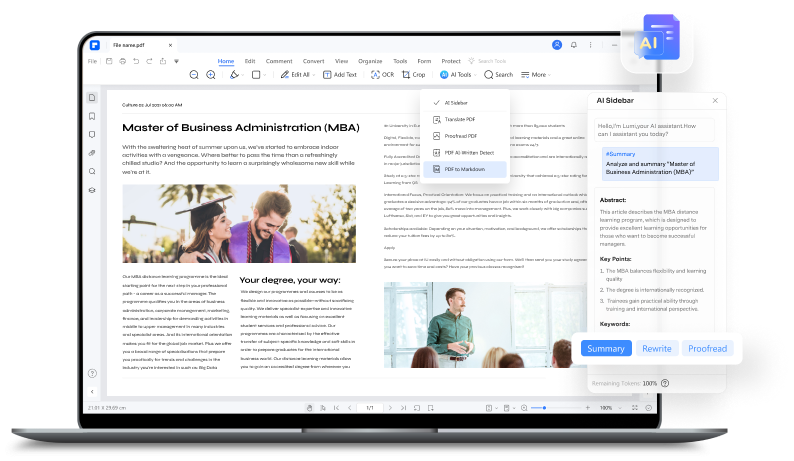This article offers a comprehensive guide to translating PDFs from English to Portuguese seamlessly, outlining four methods to simplify the process and ensure accuracy and efficiency.
Welcome to your gateway to effortless communication! In this guide, you’ll delve into translating documents from English to Portuguese. Whether you’re a business professional, student, or traveler, these four methods simplify the process, ensuring precision and speed. Bid farewell to language barriers as this article walks you through the steps to seamlessly convert your documents.
From translating business reports to academic papers, the methods introduced in this article streamline the entire process, guaranteeing smooth communication across languages. Say hello to a world without borders, as this guide empowers you to translate PDF from English to Portuguese effortlessly!

Part 1. Four Easy Ways To Translate Document From English To Portuguese
In this segment, this article unveils four simple yet powerful methods to effortlessly translate documents from English to Portuguese. Whether you’re a professional seeking to expand your global reach or a student exploring new cultures, these techniques offer practical solutions to break through language barriers.
From user-friendly online tools to intuitive software options, this guide has curated a selection of the best resources to streamline your translation process. Dive into this journey to bridge linguistic gaps and unlock boundless opportunities through the art of document translation. Let’s dive in!
Tool 1: Use a Powerful Desktop Tool – PDFelement Pro
Wondershare PDFelement is your ultimate solution for all things PDF-related. Designed with simplicity and power in mind, PDFelement empowers users to create, edit, convert, and sign PDF documents easily. Whether you’re a business professional, educator, or student, PDFelement streamlines your workflow and boosts productivity like never before.
It also provides an easy-to-use method of translating documents from English to Portuguese. The software makes it easy to get accurate and well-formatted translations.

How To Translate a PDF From English To Portuguese With PDFelement
Experience the power of Wondershare PDFelement and take control of your PDF documents like never before! To translate a document from English to Portuguese using PDFelement, follow these steps:
Step 1: Download and install Wondershare PDFelement, then activate the app. Click Log in found at the upper right corner of the screen. Sign in to Wondershare using a Google, Facebook, Twitter, or Microsoft account. Once done, click Open PDF and select the file you want to translate.

Step 2: Under the Home tab, navigate to AI Tools, then click Translate PDF. Pick Portuguese as the Target Language, then click Translate to begin the process.

Step 3: Let the AI finish translating. Once done, review the English-to-Portuguese translation. If satisfied, choose File > Save as or Export. Select your file type and share the PDF translation.

How To Translate Specific Text From English to Portuguese Using PDFelement
PDFelement can also easily help you translate a specific text from your document. Learn how to do this below:
Step 1: Launch PDFelement and open your PDF file. Click the “Translate” icon on the right side of your screen, then choose your desired outcome language. Copy the text you want to translate and paste it into the translation area. PDFelement’s AI feature automatically shows the translated text in the AI sidebar.
Tip: A toolbar automatically pops up once you highlight your desired text. You may also click the AI function there, then choose Translate in the drop-down menu that appears to translate the text you highlighted.

Step 2: Once PDFelement finishes translating, save the file following the usual saving process.
Note: If your document is not a PDF, you may use the Create button to create a PDF from the original file.
Tool 2: Translate PDF To Portuguese Using Your Mobile Device
Some mobile devices come with a built-in translation app. For example, an iPhone running on at least iOS 14 has its own Translate app.
Step 1: Launch the Translate app on your iPhone.

Step 2: Set your desired language translation and enter the text you want to translate. The app automatically translates the text you entered. Click the “play” icon to hear how to pronounce or read the translated text.
Tip: The Translate app also lets users enlarge, save as a favorite, search for a word in its dictionary, or copy the translated text.

Note: However, if you don’t have a built-in translation app, you may need to install a mobile app to help you translate a document or text. Visit your device’s Google Play Store or App Store. Search for a reliable translation app, install it, and then follow its on-screen instructions on how to use it.

Tool 3: Translate PDF Using Google Translate
In this segment, you’ll be able to explore how you can leverage the power of Google’s free translation tool to convert text from one language to another seamlessly. Whether you’re communicating with friends abroad, conducting research in a foreign language, or simply learning a new language, Google Translate offers a convenient and accessible solution.

Step-by-Step Guide
Dive into this step-by-step process of harnessing Google Translate’s capabilities to break down language barriers and expand your linguistic horizons.
Step 1: Open your web browser, navigate to Google Translate, and click the Documents tab. Select the language you want to translate from and the language you want to translate to using the drop-down menus at the top of the page.

Step 2: You may Drag and drop your document or click the Browse your files button to upload your document. Once done uploading, click Translate to start the process.

Step 3: You may download your translated document directly or open it on a new tab to review.

By following these simple steps, you can leverage the power of Google Translate to translate text effortlessly and accurately, opening up a world of possibilities for communication and understanding across languages.
Tool 4: Use Microsoft Word To Translate Document From English To Portuguese
There is also the possibility of a hassle-free method of converting a document from English to Portuguese using Microsoft Word. Making use of this uncomplicated approach guarantees both accessibility and ease. Please proceed with these three easy steps:
Step 1: Open the English PDF file in Microsoft Word and proceed to the next step. Make sure that the Open button is selected from the File menu. You will need to select the PDF file saved on your computer to translate something.
Step 2: To give Word permission to convert the content into a format that may be edited, click the OK button.
Step 3: Navigate to the Review tab, then click Translate. Select either the Translate Selection or the Translate Document option in the drop-down menu that appears.

Step 4: In the right side panel, choose English for From and Portuguese for To. Once you are done setting the languages, click the Translate button.

Step 5: Take a look at the document that was translated. To ensure correctness, make any necessary modifications. Save the document once you are satisfied with it.
Part 2. Choosing the Best Translation Approach
Individual needs and tastes should be considered for the best translation approach. In this section, this article quickly goes over each approach and the situations in which it is most useful.

Using Wondershare’s Dedicated Tool PDF part
PDFelement is perfect for translating whole PDFs to Kannada. A specialized program with all the bells and whistles keeps the formatting intact.
Benefits
Complete document translation with no gaps
Convenient with options for document-level and sentence-level translation
Focus on preserving the original layout for visual consistency
Edit text, images, and pages within your PDF documents effortlessly.
Convert scanned documents into editable and searchable PDFs in just a few clicks.
Easily create, fill, and electronically sign forms to streamline your workflow.
Protect sensitive information with password encryption and redaction tools.
Share and review documents with colleagues or clients, ensuring smooth collaboration every step of the way.
Disadvantage
Some advanced features may need to be purchased to access them fully.
Using a Translation App on Mobile Devices
In today’s interconnected world, translation apps on mobile devices have become indispensable tools for overcoming language barriers. Let’s explore the benefits and disadvantages of using translation apps.
Benefits
Readily available on mobile devices, allowing you to translate text on the go, anytime and anywhere.
Supports a wide range of languages and offers various features such as text translation, voice recognition, and even offline capabilities, catering to diverse needs and preferences.
Enable real-time communication by providing instant translations during conversations, ensuring smooth and effective communication across languages.
Disadvantage
Some translation apps require access to personal data or may store translation history, raising concerns about privacy and data security.
Translation apps may struggle to accurately convey certain phrases or expressions’ intended meaning or cultural nuances, leading to misinterpretations or misunderstandings.
Translation apps that rely on internet connectivity may face challenges in areas with poor or no network coverage, limiting their usefulness in remote or offline environments.
By means of Google Translate
For quick translations, Google Translate is great. The accessibility and ease of use you require are also provided.
Benefits
Rapid translation outcomes
Apt for general information and easy comprehension
Free and easily accessible
Disadvantage
The translation’s quality might fluctuate according to the text’s complexity
It could miss nuanced expressions
Making Use of Microsoft Word
For those already familiar with the Microsoft Word interface and looking for a translation service that works with Word, Microsoft Word is a good choice.
Benefits
The ability to inspect and change translated information within the document
A practical solution for those already fluent in Microsoft Word
A familiar interface that simplifies navigation
Disadvantage
Translation may lose some of the complex formatting in PDFs.
Conclusion
Mastering the art of translation opens doors to endless possibilities in communication and understanding. Whether you’re using powerful desktop tools like Wondershare PDFelement or harnessing the convenience of online platforms such as Google Translate, the ability to translate text and documents from English to Portuguese empowers you to connect with a global audience, expand your horizons and break down language barriers.
So, whether you’re a business professional, student, or traveler, embrace the tools and techniques discussed in this article to unlock the full potential of translation and embark on a journey of cultural exchange and collaboration. Let’s continue to bridge the gap and translate PDFs from English to Portuguese with confidence and ease.


